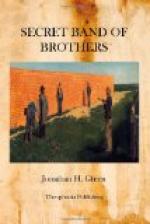From Scott’s Weekly.
The interesting question between Mr. J. H. Green, the Reformed Gambler, and Mr. J.G. Freeman, as to the rights of gambling, was discussed in the Lecture-room of the Museum Building, on Monday evening last. A large audience attended, and notwithstanding the zeal of Mr. Freeman more than once carried him a little beyond the limits of propriety, the whole passed off pleasantly.
The announcement in the papers was not adhered to, which created some dissatisfaction; but then the speeches of Mr. Freeman were of themselves well worth the price of admission. He did not defend gambling—he could not, he said, pretend to defend it—he only meant to deny the sweeping aspersions of its foes. He spoke at great length, and sometimes his logic was quite ingenious.
Mr. Green confined himself to a few facts, leaving the more minute part of the discussion for a subsequent evening.
The Rev. John Chambers closed the proceedings by a few timely remarks, in which he reviewed what he considered lawful and unlawful pursuits—among these latter, he hoped to see the time that every vender of intoxicating liquors would be placed in the same catalogue that gamblers are by the recent law—imprisonment. He then referred to the decorum of the audience, and expressed a hope that all the future discussions would be listened to in the same spirit—that all the truth possible may be elicited in reference to that terrible vice—gambling.
From the Inquirer.
The long-talked-of debate upon gambling and its tendencies, was commenced last evening in the Lecture-room of the Chinese Museum. The audience was large, and deep interest was manifested in the discussion. Aboard of highly respectable gentlemen presided as Moderators, and Dr. Elder officiated as chairman.
Mr. Freeman, the challenger, opened the debate, and proposed that the question be met in a categorical form, thus:—Were the laws of the different states which make gambling a Penitentiary offence unjust and impolitic? Were they formed in good policy or not?
Mr. Freeman considered himself as honoured in being permitted to speak before the meeting on the question. Fearful odds were against him; all the ranks of battle were on the other side. The clergy, who were accustomed to public speaking, were against him—as well as the editors and the press. In the war now raging, the climate—the sickly climate, was more dangerous than the shells and shot of the enemy—and in this case, the sickly climate was the prejudice, the prejudice of opinion, which was against the cause he espoused, or rather defended. Mr. F. also referred to other influences against him. Mr. F. contended that even, if the states in which such laws were passed, disliked the vice of gambling—it was no reason why they should pass laws that were unjust and impolitic.




